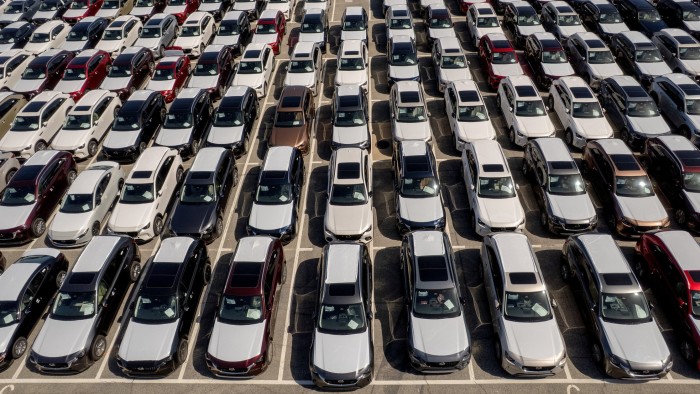Stay informed with free updates
Simply sign up to the Automobiles myFT Digest — delivered directly to your inbox.
Carmakers are holding thousands of vehicles at US ports and temporarily halting shipments as they seek to minimise the fallout from President Donald Trump’s intensifying trade war.
Some manufacturers have begun delaying the entry of their stock into the US in recent days, three executives in the logistics and automotive sectors told the Financial Times.
One warned that the piling of imported vehicles at American ports could get “quite ugly” with ports set to “fill up fast” in a few weeks if US tariffs are not softened amid the confusion over how the measures will be applied.
“We are getting closer to capacity at some ports,” said one logistics executive.
Some brands such as Audi, Jaguar Land Rover and Aston Martin have suspended or minimised shipments to the US for April as they bet that their current inventory there will tide them over in the short term.
In Germany, Bremerhaven, one of the world’s largest car ports, said it expected to lose up to 50 per cent of vehicle shipments to and from the US — a market that accounts for just under a third of its total automotive traffic.
“We will also feel the effects,” said Matthias Magnor, chief executive of BLG Logistics, which operates the Bremerhaven port.
Many industry executives are still hopeful that Trump’s tariffs against imported cars will not last for a long time, prompting some carmakers to stop shipping cars out of European factories or ports for now, according to one logistics executive.
“That temporary wait-and-see approach is the strategy,” he said, adding that carmakers are watching to see “if some compromise is reached” between the US and its trading partners.
The logistics executive added he was aware of one carmaker that had requested to have vehicles held at US ports if they arrived after the tariffs took effect. Another was holding vehicles at port in Europe that were due to be delivered to the US.
Fees for holding cars in port are high and carmakers are also seeking to move vehicles into US bonded warehouses, where manufacturers can temporarily store products without being charged tariffs.
Some Canadian-produced vehicles that are being transported by rail are also stuck at the port of entry in Detroit, according to one supply chain expert based in the US.
Trump imposed 25 per cent tariffs against all imported cars from last week, but a wide range of car parts will also be subject to the tariff from May 3, although partial exemptions have been made for Mexico and Canada.
One German car executive said that many companies were still trying to work out how exactly tariffs would be applied, as well as what constituted a car part. “Is a part an engine, or is it each screw in the engine?” the person said.
Recommended
According to US officials, vehicles compliant with the 2020 US-Mexico-Canada free trade agreement will remain exempt from the tariffs, but the 25 per cent tariffs will initially be imposed until the value of the foreign-made components can be finalised.
Carmakers are now trying to ascertain where each of component in their vehicles is sourced from, a process that is difficult and time-consuming because of the complex and global nature of automotive supply chains.
One official at a German carmaker said logistics was “a short-term tactical move”, but carmakers were not yet making long-term production decisions as there was still too much uncertainty over the longevity of tariffs, or potential retaliation by other countries.



